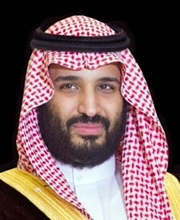Saudi Arabia’s crown prince Mohammed bin Salman has said the Jewish people have a right to their ‘own land,’ as he sought an ally against the Islamic Republic of Iran led by Ayatollah Ali Khamenei.

Saudi crown prince Mohammed bin Salman
The Atlantic magazine quoted the crown prince’s statement as he started a two-week trip to the United States where he'll meet with President Trump and seek US investments in his country.
Crown prince Mohammed bin Salman, who started off with a purge of the corrupt among the ruling class, appears to be in the middle of an attempt to rebrand the kingdom as progressive state and, judging from the headlines since last year, the strategy appears to be working, at least to some extent.
Saudi Arabia, once a hardcore Wahabi Islamic kingdom, wants to return to a “moderate Islam.” As part of the changeover, the kingdom last September, announced it would finally allow women to drive.
In an interview with The Atlantic magazine’s Jeffrey Goldberg, the crown prince has acknowledged that Jewish people have a right to their own homeland — a reversal of the policy followed by the conservative kingdom so far.
While Saudi Arabia, long known as a fierce foe of Israel, has in the past also talked about recognising Israel in the context of a peace deal with the Palestinians, the crown prince’s acknowledgement that the Jews have a right to a homeland is the clearest statement to date.
Saudi Arabia had in 2002 also sponsored an initiative to foster a two-state solution — a solution that has also long been supported by the United States. However, officially, Saudi Arabia does not recognise the state of Israel.
While Saudi officials made Israel’s withdrawal to its territory prior to the 1967 Israeli-Arab war a precondition for closer relations in the past, that fundamental demand was not explicitly repeated by the crown prince in the Atlantic interview published on Monday.
“I believe that each people, anywhere, has a right to live in their peaceful nation. I believe the Palestinians and the Israelis have the right to have their own land. But we have to have a peace agreement to assure the stability for everyone and to have normal relations,” he told The Atlantic.
The crown prince’s remarks follow months of diplomatic gestures, including the opening of Saudi Arabia’s airspace to commercial Israel-bound flights and the acknowledgment of backchannel communications between both governments.
Saudi officials appear increasingly willing to strike a carefully conciliatory tone as they seek a new ally to confront their common arch enemy Iran and build stronger economic ties.
“Saudi Arabia has traditionally been a place that has produced a lot of anti-Semitic propaganda. Do you think you have a problem with anti-Semitism in your country?” Goldberg asked later in the Atlantic interview, to which Mohammed responded: “Our country doesn’t have a problem with Jews. Our Prophet Muhammad married a Jewish woman. Not just a friend — he married her.”
“Our prophet, his neighbors were Jewish. You will find a lot of Jews in Saudi Arabia coming from America, coming from Europe. There are no problems between Christian and Muslims and Jews. We have problems like you would find anywhere in the world, among some people. But the normal sort of problems,” said Mohammed, adding that there were “lot of interests we share,” including economically.
Mohammed, 32, has attempted to position himself as a favorite for the kingdom’s younger citizens, who are less religious than older generations and are facing disproportionately high unemployment rates.
The Saudi leader is currently pursuing a major reform plan, named Saudi Vision 2030, to revitalise the kingdom’s economy.




















